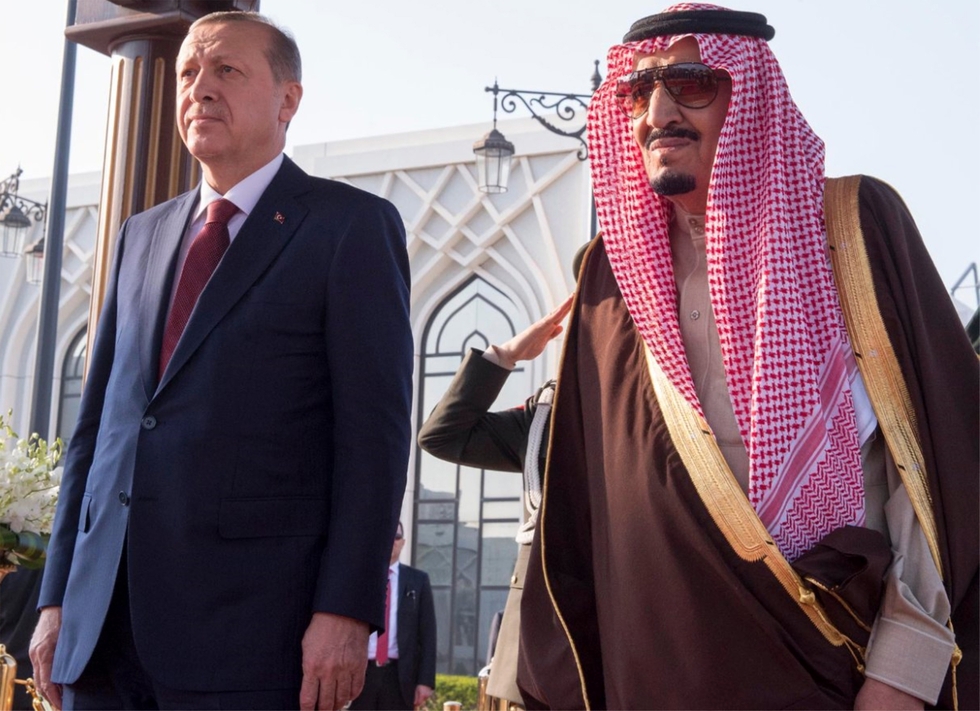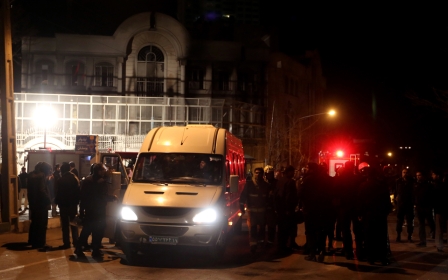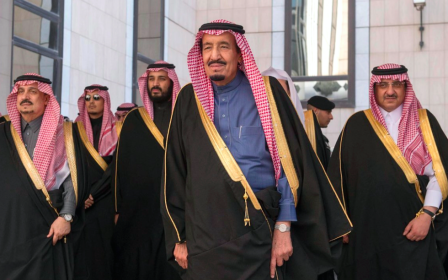ANALYSIS: Turkey walks diplomatic tightrope in Iran-Saudi showdown

ISTANBUL, Turkey – Turkey must avoid taking sides in the current Saudi-Iran dispute to avoid being fully dragged into the sectarian quagmire in the Middle East, analysts have said.
Simmering tensions between Iran and Saudi Arabia boiled over at the weekend after Riyadh executed 47 people, including Shia cleric Nimr al-Nimr.
Despite Turkey having friendly relations with both countries, the government in Ankara has moved closer to the Saudis since the accession of King Salman last year; slamming Iran’s alleged involvement in Yemen, joining a Saudi-led “anti-terrorism” alliance and last week setting up a "strategic cooperation council".
Relations with Tehran, meanwhile, have strained due to Yemen, Iran's support of Bashar al-Assad in Syria, and its interventions in Iraq.
But analysts warned that Ankara must resist any attempts by Saudi Arabia to fully involve it in its direct dispute with Iran, a move that could prove costly to Turkish diplomacy as well as its economy.
Ahmet Kasim Han, a professor of international relations at Istanbul’s Kadir Has University, said Turkey had too much at stake to involve itself in another regional dispute.
“Turkey’s relations with its number one gas provider Russia are frozen. It is very unlikely that Ankara will want to ruffle the feathers of its second-largest gas supplier, Iran, at this point,” Han told Middle East Eye.
“I don’t see how Ankara could be keen to add another headache to an already long list caused by its foreign policy positions of late. Under normal circumstances I don’t see the Saudis being able to drag Turkey into this conflict."
However, he added that might change "given the situation in the Middle East is very fluid".
Benefits of neutrality
Kerem Alkin, a macroeconomist and professor at Istanbul’s Medipol University, believes Turkey is well aware of the advantages of adopting a neutral position in the region and will resist Saudi attempts to drag it into the conflict as long as Iran doesn’t do anything to further sour relations with Ankara.
“We just need to look back at the Iran-Iraq war of 1980-1988. Turkey maintained strict neutrality and was rewarded with massive export volumes to both countries,” Alkin told MEE.
“If Iran wants to see Turkish neutrality, it too will have to adopt a neutral position in the Turkey-Russia dispute. Otherwise there is a likelihood that Turkey will take sides regardless of its natural inclinations,” said Alkin.
Mensur Akgun, the chairman of the international relations department at Istanbul’s Kultur University, said he believed it was in Turkey’s interest to maintain amicable ties with Iran, which it shares a border with.
“All statements thus far from government officials suggest that Turkey is going to maintain a balance and call on both sides to defuse tensions,” Akgun told MEE. “Turkey has maintained amicable ties with Iran during tougher times and is unlikely to jeopardise them now and risk even more uncertainty along its already volatile borders.”
In an address to his party's MPs on Tuesday, Turkish Prime Minister Ahmet Davutoglu said: "We expect all countries in the region to show common sense and take steps aimed at easing the tensions in the region."
He added: "As Turkey, we are ready to make any effort to solve the problems between the two countries."
Earlier on Monday, Deputy Prime Minister Numan Kurtulus criticised both Saudi Arabia and Iran and called for calm.
Apart from chastising Iran for not providing sufficient protection for foreign diplomatic missions on its territory, he also criticised the Saudis for political executions, keeping Ankara on the same page as its Western and NATO allies.
Akgun also believes Turkey will not be forced into siding with Saudi Arabia despite their shared views on Syria since it considers Qatar as its main ally in the Gulf.
“Qatar is the key country for Turkey among the Gulf states. Just like Doha has refrained from taking sides, I think Turkey too will refrain from taking sides in this situation,” he said.
Longer term strategies
While Turkey will avoid siding with the Saudis in the short term because it will hurt it both economically and diplomatically - and also because the United States appears keen to keep itself out of this crisis - the medium to long-term represents a totally different picture, according to Han.
In Han’s view, there is a convergence and overlapping of Israeli and unofficial Saudi foreign policy aims, which suits Turkey. Han said he believed recent comments by Turkish President Recep Tayyip Erdogan explaining how much Israel and Turkey needed each other in the region point to Ankara’s longer term plans.
“We know that Israeli and unofficial Saudi foreign policy overlap and Turkey will try to adjust its policies and fall in tune with those two countries, thus forming an anti-Iran alliance in the mid to long term,” said Han.
Ever since Turkish-Russian relations nosedived in November 2015 after the shooting down of a Russian jet, Ankara has been rattled and fears an expanding Russian-Iranian alliance that could leave it isolated in the region.
But most analysts agree that Turkey has no option other than adopting a non-sectarian and neutral position at the moment as the other two regional heavyweights collide. The missed economic opportunity alone by shunning Iran just as it is about to open up to the outside world would be a blow that Ankara can ill afford.
Regardless of the financial incentive that close relations with the Saudis brings in terms of investments in the economy, Turkey needs to ensure that it doesn’t damage its relations with Iran beyond the point of repair in order to reap the economic benefits of its years of friendly ties with Tehran.
“Once nuclear-related sanctions on Iran are lifted, Turkish firms involved in manufacturing, construction, retail and so many other sectors will find themselves in a prime position to take advantage of an untapped market of 80 million people,” said Alkin.
“If Turkey wants to attain its lofty centennial goals in 2023, it will have to have all these markets rather than substituting one lost market with another,” said Alkin.
New MEE newsletter: Jerusalem Dispatch
Sign up to get the latest insights and analysis on Israel-Palestine, alongside Turkey Unpacked and other MEE newsletters
Middle East Eye delivers independent and unrivalled coverage and analysis of the Middle East, North Africa and beyond. To learn more about republishing this content and the associated fees, please fill out this form. More about MEE can be found here.




